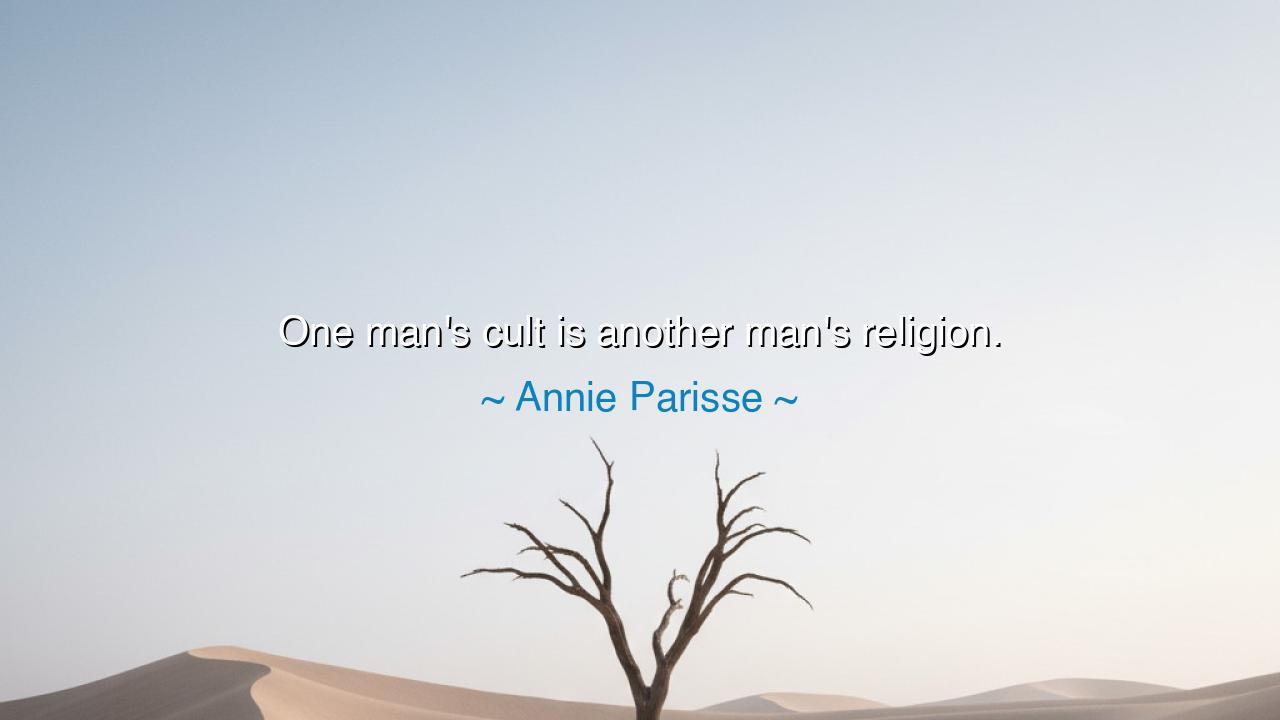
One man's cult is another man's religion.






Hear now the wisdom hidden in the words: “One man’s cult is another man’s religion.” Though the tongue of Annie Parisse uttered this saying in an age not long past, its roots reach into the soil of all human history. For in the eyes of mortals, truth is not always fixed like stone, but often fluid like the sea, shifting as it is seen from shore to shore. That which one tribe hails as holy, another despises as dangerous. That which one nation crowns as sacred, another denounces as madness. Thus, the saying teaches us that belief, like fire, can be both lamp and conflagration, depending upon whose hands hold it.
In the dawn of ages, when the Romans marched across the world, they encountered many strange peoples. To the Roman, the rites of the Christians seemed a cult, secretive and dangerous. Yet to those humble followers of Christ, theirs was no cult but the true religion, the way of salvation. In time, what was once mocked and persecuted grew strong, outlasting the empire itself, and crowned emperors under its banner. Here we see the wisdom of the saying: what is dismissed as folly today may be honored as faith tomorrow.
Consider also the tale of Siddhartha, the Buddha. To the rulers of his land, his departure from worldly duty was scandalous. To his family, his quest for truth was madness. But to the multitudes who gathered at his feet, his words became the foundation of a great and enduring religion, shaping the lives of millions across the centuries. Thus, the line between cult and religion is not written in heaven but in the hearts of those who believe.
Let us not forget the tale of the Prophet Muhammad, peace be upon him. In his earliest days, his followers were a small band scorned and hunted. To the lords of Mecca, his teaching was a threat, a dangerous sect that must be silenced. But history turned, and the voice of one prophet became the faith of a vast civilization. The mocked cult was revealed to be the guiding religion of nations. And so the saying again proves true: men’s judgments are bound by time, but the worth of a vision is revealed only in the unfolding of generations.
What lesson then, child of tomorrow, shall you carry from these stories? It is this: judge not too swiftly the faith of another. For what you call madness may be another’s sanctuary, and what you dismiss as folly may be another’s treasure. Indeed, the measure of belief is not in the eyes of outsiders, but in the strength it gives to those who hold it. The wise do not scorn easily, but seek to understand.
Let your heart therefore be open. When you hear of practices strange or unfamiliar, do not rush to mock or condemn. Instead, listen, question, and ponder. Ask: What hope is hidden here? What pain does it heal? What hunger of the soul does it feed? For in the answering, you may find that the strange is not so far from your own longing.
Thus, the clear path of action is before you: walk with humility, speak with respect, and hold your own faith with courage while honoring the faith of others. In doing so, you build bridges where others build walls, and you partake in the eternal work of peace. Remember always: the fire of belief may burn, but it may also guide. To some it is a cult, to others a religion, but to the seeker it is always a mirror of the soul.






AAdministratorAdministrator
Welcome, honored guests. Please leave a comment, we will respond soon